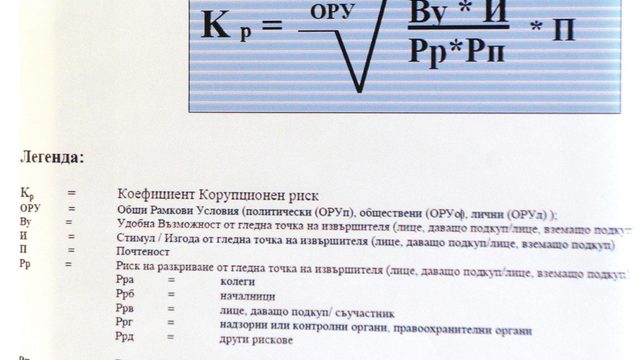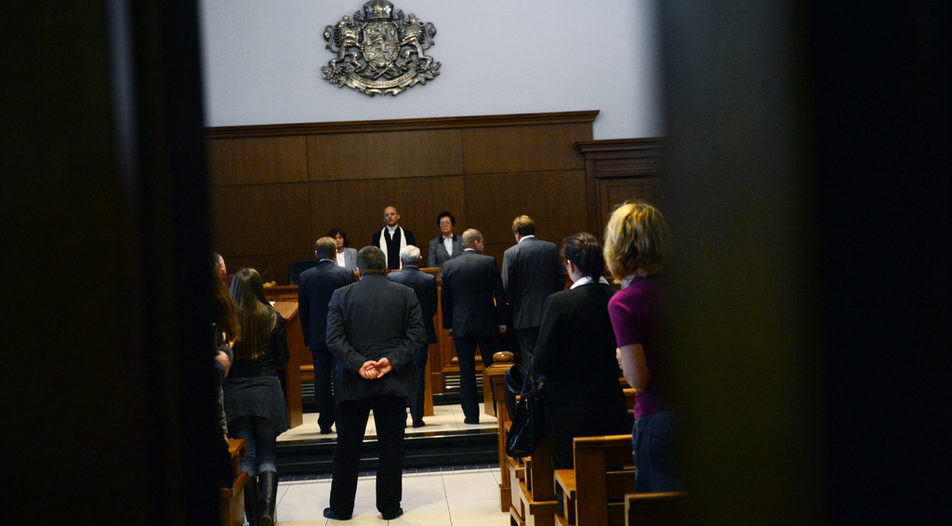It will be unfair to say that no effort is being made to fight corruption in Bulgaria. But in a nutshell, the anti-corruption efforts are slow, without strategic vision, following the vague advice from the European Commission. Most of the time the necessary political will is there but the resulting actions are technocratic and without any concern about the outcome or the real impact.
Understanding why it doesn't work at the end also needs a bit of understanding of the power politics in Bulgaria.
The power play
There are two levels at which the government fights corruption - through prosecution of corrupt officials and through administrative measures/reforms that eliminate the graft incentives.
The prosecution approach is largely ad-hoc, focusing on low or mid-level officials. There are two key reasons that explain the lack of convicted high-level officials.
First, the decision on targets for high-level prosecution is based on a political consensus between Prosecutor General Sotir Tsatsarov and Prime Minister Boyko Borissov. This is not a formal process that the law requires, but rather a political reality. In the Bulgarian constitutional set-up, they are equals: the prosecution is independent, not part of the executive branch and is elected through a procedure that involves the parliament, the president, and the prosecutors themselves. As independent players they both have their own power-base, serving their own business and political constituencies.
This power play was made crystal clear five years ago when Mr. Borissov fell victim to the prosecutor general's wrath (who suspected him of trying to undermine his power). In 2013 Mr. Borissov fell from power, after the prosecution, helped by political opponents and media groups connected to them, presented the public with a series of conspiracy theories of Mr. Borissov's attempts to manipulate the early general election in May of that year. This tipped the scales of the public opinion just days before the vote and Borissov's GERB party lost several percentage points, enough to make him unable to form a government and force him into opposition. Mr. Borissov was taught a lesson how to respect the prosecutor general.
It is not easy to find consensus on whom to go after between Mr. Tsatsarov and Mr. Borissov, therefore lower-level officials are targeted where neither of the two powerholders has anything to lose (tax, customs, or roads administration, entrenched 'feudal' mayors without support from major political parties). High-level public officials are targeted only when their downfall makes sense politically. That was the case of the former government ministers from the Reformist Bloc (GERB's former coalition partners after the next early election held in 2014): Mr. Tsatsarov was the main target of the Reformists' criticism of the unreformed judiciary, while GERB was losing votes to them. Therefore, it was convenient for both Borissov and to go after them.
This power politics between Mr. Tsatsarov and Mr. Borissov also directly impacts the effectiveness of the anti-corruption institutions. The prosecution and investigative units are small and managed by individuals trusted personally by Mr. Tsatsarov or Mr. Borissov. In this way both of them can personally control the work of those officials and its outcomes. Large and independent units are out of the question as they could undermine the authority of the prime minister and the chief prosecutor.

In 2015 the Bulgarian government under Mr Borissov adopted its first ever anti-corruption strategy. The analysis leading up to its adoption had concluded that the handful of institutions set-up over the past decade to fight corruption were largely weak (without capacity to uncover corruption), with limited powers, too much politically dependent by design (meaning that their leadership largely changes when governments change), or (some) even without a clear purpose.
The handful of prosecutors (between 5 and 10) dedicated to fighting corruption and the two dozen investigators supporting them were too few to handle even a modest number of serious investigations. This explains why less than 100 people are convicted annually on corruption charges (none of them in serious cases). The number of people working in anti-corruption institutions (investigators, prosecutors, ministerial or municipal inspectorates, internal affairs units) is far smaller compared to countries with a much lesser corruption problem in Western Europe. Take the Metropolitan Police in London, which is approximately the size of Bulgaria's Interior Ministry staff (around 45 000) - the Met's internal affairs/professional standards units have about three times more staff than their Bulgarian equivalents.
Just like many other strategies adopted by the government, the anti-corruption strategy remained yet another piece of paper without any real follow up.
Strategies do not mean much in Bulgaria. They typically remain bureaucratic manoeuvring where ministries mostly exercise their creativity in reporting 'measures' to implement the strategies, when in fact very little happens. When it does happen, i.e. someone gets caught or even convicted for corruption, it's usually not because of a specific strategy, but rather because there is political will to fight graft somewhere in the branches of government.
The Anti-Corruption and Asset Forfeiture Commission established earlier this year suffers from the same malaise as its predecessors - political overdependence, insufficient capacity and limited powers. It will be a few years before it is fully developed and any real change can be felt.
The administrative nightmare
Еven when the interests of the prime minister align with those of the prosecutor general, there is another obstacle - the unreformed judicial system. Its antiquated and over-formalistic approach to the criminal justice process, coupled with the corruption of the judiciary, make it very difficult for an investigation to be successfully brought to court and result in the conviction of a corrupt official. Hence, the effective prison sentences issued in such court cases are typically less than 100 per year.
Mass corruption (e.g. traffic cops, municipal officials, public procurement officials) cannot be tackled via investigations, as there are thousands of officials taking small bribes. Fighting mass corruption requires administrative reforms, investments in monitoring systems, or legislative changes. There are no political obstacles to these types of reforms, and in principle Mr. Borissov personally supports and even initiates them (e.g. he personally insisted on cameras and microphones in all traffic police cars in order to monitor the behaviour of police officers).
In most cases, political corruption on the national level is not linked to mass corruption practices (that's not the case on the level of local government, though). Government ministers and heads of agencies do not profit from the small fish collecting bribes. Mr. Borissov does not tolerate petty corruption and occasionally senior officials are dismissed when this kind of behaviour surfaces, as in the cases of the heads of the government's Automobile Administration Executive Agency or the State Agency for Refugees.
Administrative reforms are difficult and the administration does not have the capacity to reform itself. An example of the level of complexity even of one such narrow aspect such as traffic cops, where some reforms took place in the past two years, can give an idea about the degree of commitment needed.
Following Mr. Borissov's push for cameras, millions of euro were spent to change the entire process of making guilty drivers pay for their offences: refurbishing police cars with new technology and related IT systems, to installation of dozens of new traffic cameras; automation of IT systems and processes for collecting the traffic fines at the National Revenue Agency, to introducing electronic services for the payment of fines. It required amendments to several laws to make these new processes legal, as well as the establishment of new units within the Police Internal Affairs departments to monitor the new systems and cameras. Finally, disciplinary sanctions were imposed on hundreds of suspected corrupt cops, and subsequently almost 1000 traffic cops moved to other police duties.
Similar reforms in numerous other areas would require lots of political energy, investments, and much more expertise than there is currently (or has been in place) in the government.
There are no obvious political gains for Mr. Borissov to invest his political energy or budget in such complex anti-corruption administrative reforms with unclear results. Only a small part of the electorate (probably about 10%) genuinely cares about corruption and judicial/administrative reforms but they do not support GERB and its coalition partners (or opposition Bulgarian Socialist Party) anyway. In theory, Mr. Borissov could attract these 10% by pushing for such reforms but such a reform drive may repel part of his local-level clientele (regional government officials or small town municipal workers), which is just as important and sizeable as the reform-minded voters whom he would potentially attract.
* Philip Gounev was a Deputy Minister of the Interior (2013 and in 2014-2017).
Previously he worked with the Center for the Study of Democracy in Sofia and was a member of the European Commission's group of experts. Now Mr Gounev is an independent consultant.
It will be unfair to say that no effort is being made to fight corruption in Bulgaria. But in a nutshell, the anti-corruption efforts are slow, without strategic vision, following the vague advice from the European Commission. Most of the time the necessary political will is there but the resulting actions are technocratic and without any concern about the outcome or the real impact.
Understanding why it doesn't work at the end also needs a bit of understanding of the power politics in Bulgaria.












